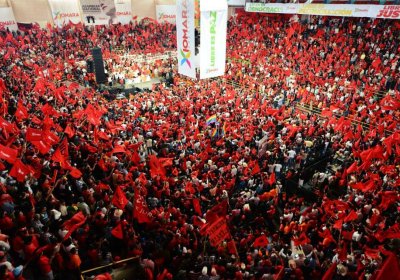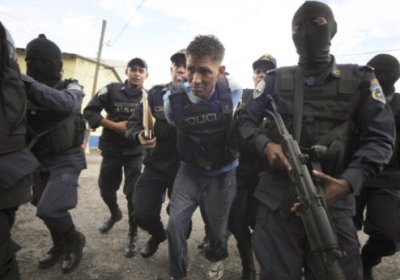Honduras
The open letter printed below, which was sent to the New York Times public editor Margaret Sullivan was signed by more than a dozen experts on Latin America and the media. Signatories to the letter, released on May 14, signatories included academic Noam Chomsky, filmmaker Oliver Stone, Venezuela Analysis founder Gregory Wilpert and several other experts. To join the campaign, visit New York Times Examiner.
* * *
Dear Margaret Sullivan,
The doctrine of national security imposed by the United States on Latin America, which fostered the dictatorships of the 1970s and '80s, is making a comeback in Honduras. A new law is combining military defence of the country with police strategies for maintaining domestic order.
The law created the National Directorate of Investigation and Intelligence (DNII), a key agency in the security structure that does not appear to be accountable to any other body, and does not appear to be under democratic civilian control.
Gunfire erupted from helicopters provided by the US State Department and carrying Drug Enforcement Agency (DEA) trainers and Honduran police on May 11. The shots killed four Hondurans described by locals as fisherpeople. Two of them were pregnant.
Who did the shooting is unclear. US officials said the fisherpeople were caught in the crossfire of an anti-drug mission.
There is no end in sight to violence and repression in Honduras. There is also no end in sight to the United States and Canadian governments and business maintaining political, economic and military relations with the country's military-backed regime.
Even after US Drug Enforcement Administration officers killed at least four Honduran civilians ― including two pregnant women ― in the name of the "drug war", two more journalists, Alfredo Villatoro and Erick Martinez Avila, have been killed in the Central American nation.
After two weeks of hard work to obtain signatures and the constitutive documents, on October 27 the National Front of Popular Resistance (FNRP) presented before the Supreme Electoral Tribunal more than 81,000 signatures and other documents supporting the request for the inscription of the political instrument, the Freedom and Refoundation Party (LIBRE).
A national assembly of the National Front for Popular Resistance (FNRP), uniting more than 1500 delegates from across Honduras, voted on June 26 to launch a new political party, the Broad Front of Popular Resistance (FARP).
The FNRP is the main coordinating body of popular struggle since a right-wing coup overthrew the democratically elected government of president Manuel Zelaya two years ago, on June 28, 2009. One of its key demands is for a constituent assembly to draft a new democratic and pro-poor constitution.
After nearly two years of living in exile following the June 28, 2009 coup that overthrew his government, former Honduran President Manuel Zelaya returned to his nation on May 28.
The agreement that allowed for Zelaya’s return, negotiated by the governments of Venezuela, Colombia and current Honduran President Porfirio Lobo, dropped fraud charges lodged against Zelaya, permitted a future plebiscite on constitutional reform and cleared the way for the readmission of Honduras to the Organization of American States, which lost its membership after the coup.
Honduran President Porfirio Lobo Sosa and former president Manuel Zelaya Rosales signed an agreement on May 22: “For National Reconciliation and the Consolidation of the Democratic System in the Republic of Honduras”.
Lobo was elected in November 2009 in a rigged vote. The poll was organised by the regime installed by the June 28, 2009 military coup that overthrew Zelaya.
United States President Barack Obama’s visit to El Salvador on March 22 became a focal point for protests.
Protests were organised that day by Central American social movement organisations and their North American allies outraged by US trade policy and military meddling in the region.
Local environmental and community organisations joined with allies such as US-El Salvador Sister Cities and Committees in Solidarity with the People of El Salvador to mobilise students and workers for rallies in the US and El Salvador on March 22.
A number of Wikileaks revelations have shown that US officials, despite their public stance, have been well aware of corruption and human rights abuses of regimes it has supported. In some cases, the US funded these regimes and trained their military.
* * *
Indonesia
A leaked September 2009 US cable indicates that US officials are aware that in West Papua, the Indonesian military (TNI) are responsible for serious human rights abuses and corruption.
“The National Front of Popular Resistance (FNRP) expresses its energetic condemnation of the massacre against the campesino community in El Tumbador, Trujillo, in which our companeros Ignacio Reyes, Teodoro Acosta, Siriaco Munozm Raul Castillo and Jose Luis Sauceda were assassinated”, the FNRP said in a November 16 statement.
All of those killed were members of the Campesino Movement of Aguan (MCA). The campesino activists were killed by assassins hired by pro-US oligarch Miguel Facusse, who helped fund the coup that overthrew president Manuel Zelaya last year.
- Previous page
- Page 6
- Next page






